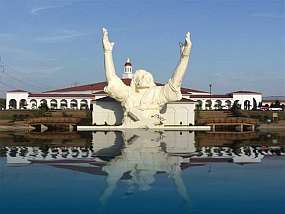Over my break, I heard a young, Christian man tell an assembled crowd how he was forsaking his house, his job, and his former life to give everything for the cause that has captured his heart.
Usually, the passion of men and women on fire for a righteous cause enflames my own heart, but honestly, I was bored to tears and wanted to get up and leave.
It’s not because the cause wasn’t just and right and noble and oh so needed, but because I can no longer get fired up for any old cause within the Body of Christ—save one.
The amount of spam in my Cerulean Sanctum mailbox from Christian organizations lamenting the state/condition of this institution or that now overwhelms the legitimate email. I look at my inbox and see it as the perfect microcosm of where the Church in America is today. We’re like Don Quixote, and the world is a vast plain strewn with windmills.
Tilt. Tilt. Tilt.
Funny thing about that young, Christian man I heard speak. At his age, I was zealous for the same cause he was. That’s not the case now. Old age is teaching me something.
Over my break, I watched a few episodes of Mythbusters. Being a science-y sort of guy, I find the show interesting and informative.
One of the phrases they used a lot in the episodes I saw was physics thought experiment, meaning that physicists had created an illustration based on scientific principles to explain a foundational concept in simple terms.
I want to attempt the same thing.
From what I can tell, there are 300,000 churches in the United States. Our population is close to 300 million. Roughly 40 percent of our population claims to attend church services on any given weekend. That’s about 120 million people who could be said to be Christians of some type. Doing the math yields an average local church size of about 400 people. That sounds like a reasonable number.
With a church of 400 people living out genuine Christian discipleship according to the Bible, how impossible would it be to think that those 400 would be used of God in a given year to lead 20 unbelievers to Christ? We’re talking a 5 percent conversion factor.
Now how is it, in reality, that in the average church of 400 people such a thing is unheard of?
Some will object and point to our children coming to Christ. Heaven help us, I hope that would be so—a given even—but I’m less concerned about the basics of a Christian husband and wife replacing themselves in the church pews via their two children (on average), and more concerned with reaching people who would never otherwise darken the doorway of a church.
Fundamentally, I want to know why, of the myriad Christian causes of worth, the Great Commission—the one Jesus charged us with before He left this earth—has become the most neglected.
How is it that we can get whipped into a frenzy about aiding the poor, stopping same sex marriage, putting more conservatives into the halls of American power, and a million other causes, but the simple act of helping lead a lost soul to Christ is something we have neither time nor energy for?
Let’s be honest here. The Great Commission no longer compels us. The proof is right before our eyes, but we don’t want to see it.
I read ads for churches that proclaim that theirs is Spirit-filled. I hear Christians talking about charismatic gifts and soaking in the Spirit. Everyone seems to be about ushering in the Spirit during worship. We talk and talk and talk about the Spirit and being filled by Him.
But no surer sign exists for being Spirit-filled than having a burning desire to see the lost come to Christ. Being Spirit-filled awakens the Christian heart to the brutal emptiness of what it means to lack Christ. The stark division between having Christ and not having Him ends up driving the believer to share Christ with anyone who will listen.
That reality used to compel the saints of old. Christians would die to ensure that one more soul came to knowledge of Jesus. Believers gave everything they had, even their own lives, to ensure that no one would go into a Christless eternity.
Yet today, the Great Commission hardly charts on the primary cause list for most Christians.
A few years ago, I did another thought experiment in a post, wherein I computed that 4,212 people go into a Christless eternity every hour of every day. I’m sure that number is higher today.
I’m at a point in my life where I’m convinced that no cause we Christians can join trumps depopulating hell.
How is it, then, that this most important cause gets short shrift?
I see scores of people ready to radically change their lives to ensure more Republicans get into the Senate, but where are the people who forsake all so that one more person can come to know Jesus Christ?
What amazes me most of all is that many of the causes we give everything for would fix themselves if we just led more people to Jesus and trained them up to maturity.
So why don’t we do this?
My first post back from my break was going to be about freedom in Christ, and I’ll get to that soon enough. But at the very heart of freedom in Christ is dying to self. And being dead to self means no longer caring what others think of us. It’s no longer valuing what the rest of the world values. It’s realizing that eternal life is knowing Jesus, and only that matters.
That’s where we stumble in the Great Commission.
We haven’t made the choice to die to self.
We haven’t set aside the things of the world that distract us from the real work.
We don’t really know Jesus.
Don’t really know Jesus? Dan, how can you say that?
I say it because I’m increasingly aware it’s true. Most Americans Christians can’t share Jesus with another person because they don’t truly know Him. They know a few facts about Him, but that’s it. And when it comes to facts, I think average Christians would be much more likely to share their knowledge of their favorite hobby or sport than to share what little they know of Jesus.
So rather than appear to be ignorant before others of the very truth they supposedly wrap their lives around, most Christians say nothing.
I just can’t get away from that. Nothing else explains the utter lack of evangelistic fervor going on in “Christian America” 2011.
I’ve always felt my own calling was to discipling Christians to maturity, which is part of the Great Commission. But my lacks in evangelism are ever before me. I’m praying that 2011 will be the year that changes.
And that means dedicating this year to knowing Christ and making Him known.
Folks, no other cause trumps that. All others are pretenders to the throne.
God help us if we continue to fail to grasp this!


